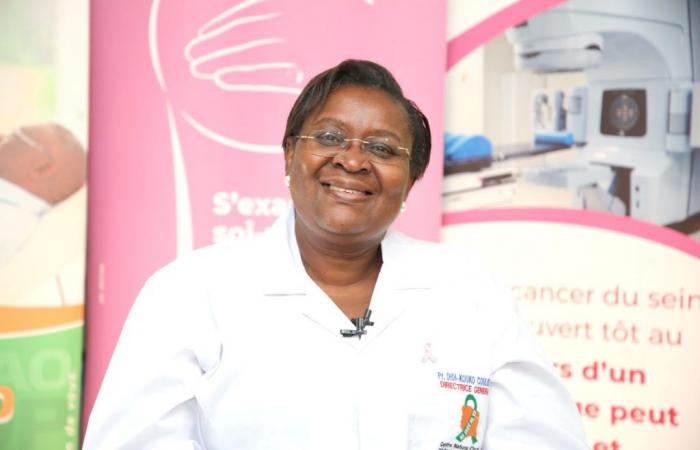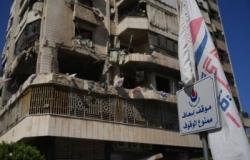
In an interview with the Government Information and Communication Center (CICG), the Director General of the National Center for Medical Oncology and Radiotherapy Alassane Ouattara (CNRAO), Professor Judith Didi-Kouko Coulibaly discusses the possibility of curing cancer in general and breast cancer in particular, if screening is done early and reflects the policy put in place by the government to fight cancer.
Present the CNRAO and what results since its opening?
The Alassane Ouattara National Center for Medical Oncology and Radiotherapy (CNRAO) is a public hospital which was inaugurated by His Excellency the President of the Republic on December 18, 2017, and opened to the population on January 25, 2018. From this date as of June 30, 2024, the CNRAO received 12,160 new patients, 63,873 consultations carried out, 3,204 radiotherapy treatments, 29,461 courses of chemotherapy and similar high treatments, 162,581 biological analyzes carried out, as well as 7876 participations in various activities. ‘accompaniement. And it’s a number that’s growing.
What is the policy put in place by the Government for the treatment of cancer in general and breast cancer in particular?
The Government has affirmed its firm desire to fight cancer in Côte d’Ivoire through its motto “Make Côte d’Ivoire a country where cancer is no longer a tragedy, but a chronic disease”. To this end, the Government has set up the National Cancer Control Program, a structure of the Ministry of Health, which coordinates all control actions. We have cancer diagnostic services (radiology, biology, pathological anatomy, nuclear medicine institute) and cancer treatment services (surgery, obstetrics and gynecology, the cancer department of the Treichville and Bouaké University Hospitals, and the National Center of medical oncology and radiotherapy Alassane Ouattara (CNRAO), which I have the honor of directing.
There is also community support organized by associations and non-governmental organizations (NGOs) fighting cancer under the leadership of the Ministry of Health.
There is also specialty training which concerns doctors, medical physicists (radiotherapy specialists); the training of health professionals which falls under the National Institute for the Training of Health Workers (INFAS).
Also, the partnership between the State of Côte d’Ivoire and the Roche laboratory allows certain anticancer drugs to be given free of charge in public hospitals, the cost of which varies between 1.5 million and 4.2 million FCFA per session, at a rate of one session every 14 or 21 days (depending on the pathology) and for at least one year. These drugs have indeed revolutionized the treatment of cancer throughout the world. However, not all cancer treatments are free.
In 2023, in the presence of the First Lady, Dominique Ouattara, we presented the results which are no different from those of the West.
To date, the State is therefore very committed to setting up the structures and equipment necessary for the effective treatment of cancer, as well as to facilitating financial accessibility.
In 2023, the number of people successfully saved from breast cancer will triple after five years of treatment (60 out of 100 instead of 20 out of 100). Political will therefore makes it possible to achieve very good results.
More particularly at the CNRAO, thanks to the support and instructions of the Government, no treatment is delayed for financial reasons. When pro forma bills are issued, people who can afford them pay directly for their care. But for those who do not have one, they are immediately taken care of, and have the possibility of paying deferred and in installments through the social worker who will present them with the recovery circuit in order to allow them to pay at their own pace. To do this, we issue a payment receipt to those who have paid the fees to better monitor people who pay deferred.
Professor, what is the role of screening in the prevention of breast cancer?
Screening makes it possible to discover the existence of cancer earlier, before the first clinical signs appear. Screening therefore makes it possible to check the body of someone who claims to be in good health to effectively ensure that they do not have a hidden illness. In medicine, when breast cancer is discovered early through screening, it can be cured in 9 out of 10 cases. In such a case, removal of the breast or chemotherapy are not obligatory.
What to do once the disease is declared?
Once breast cancer is detected, you must consult a specialist, a gynecologist or an oncologist. The latter will therefore provide appropriate care. Three main questions then arise: Is the disease small and left behind? Is the disease there, but bigger? Has the disease metastasized? For each of the answers to these questions, there is a treatment strategy that is completely different. Additional examinations and scans (PET, MRI) are necessary to better make the diagnosis. On October 3, His Excellency the Prime Minister launched the open days of the Institute of Nuclear Medicine.
Following these examinations, the doctors will meet in college for multidisciplinary consultations (gynecologist, medical oncologist, cancer radiotherapist, radiologist, pathologist). It is therefore this core of five specialists who will analyze the patient’s file (we can have breast cancer in men) to decide, based on international standards, on the specific treatment (medical treatment). There is also non-specific treatment, also called accompanying treatment or supportive care (psychological, social, spiritual, nutritional, aesthetic support, etc.). These are essential treatments in the care of a cancer patient.
The person is therefore taken care of in a holistic manner, both for medication and other non-drug support. It’s our way of telling her that she can get through it and that there are possibilities of recovery after all these treatments.
Professor, can breast cancer be cured?
Yes, cancer can be cured today, provided it is discovered early and treated correctly. This is why we talk about screening. In the case of breast cancer, ablation is not obligatory.
What is the trend in the survival rate in Ivory Coast?
The survival rate is increasing in Ivory Coast. In 2022, the CNRAO impact study, after three years of operation, indicated that we had succeeded in reducing the risk of death from breast cancer by 25%, with no difference at the scientific level between people who have breast cancer. money, who have none or who have a little. This indicated that the social actions of the State had achieved the objectives for which the State had put them in place.
After five years, the same studies were done and showed that the results were improving. We give thanks to God for the President of the Republic and may God bless all our authorities.
Your appeal to the population in general and to breast cancer patients in particular.
To the public, I would say please get tested. It’s not screening that’s going to bring cancer into your life. It just allows you to control your body while you don’t feel anything. If there is no cancer, the screening will be normal. But if there is a hidden cancer somewhere, screening will allow us to see it. Cancer can be cured today, provided it is detected earlier through screening.
To those battling cancer, you are not alone. God is with you. The authorities of Côte d’Ivoire are with you. We caregivers are with you. We know your families are with you. We must fight for everyone to be cured of breast cancer. And by the grace of God, we will get there.
CICG




